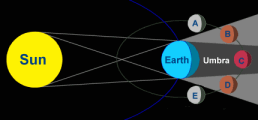|
Why Do We Have a
Lunar Eclipse? |
On
the night of May 15, 2003 a total Lunar eclipse was visible from the
Americas and Western Europe.
How often do Lunar eclipses occur, and
why does the Moon take on a reddish color?
The Moon rotates around the Earth every
29.5 days -- from where we derive the word "month." We
usually see a full Moon every month because the plane of the orbit
of the Moon is different from the plane of the orbit of the Earth around
the Sun. This is the reason we do not have a lunar eclipse every
month. But two to four times a year, the Moon's orbit
will cross through part of the shadow cast by the Earth and we will be
able to see either a partial or total eclipse of the Moon.
There are basically 3 types of Lunar
eclipses, but only two are visible to the unaided eye (the partial and
total eclipses).
1. Penumbral Lunar Eclipse
- The Moon passes through Earth's
penumbral shadow (difficult to observe).
2. Partial Lunar Eclipse
- portion of the Moon passes through
Earth's umbral shadow.
3. Total Lunar Eclipse
- The entire Moon passes through
Earth's umbral shadow.

Lunar Eclipse
(size and distance not to scale)
To be eclipsed, the Moon needs to be a
full Moon. There are two regions of shadow (the outer or penumbral
shadow, and the inner or umbral shadow). When the Moon enters the
penumbral shadow, some of the rays from the Sun are blocked, but when the
Moon enters the umbral (inner) shadow, all of the direct light from the
Sun is blocked.
The reason why the Moon is still visible
in the umbral zone is that not all of the Sun's rays are blocked.
Some of the rays are refracted as they pass through the Earth's atmosphere
and they are able to reach the Moon. Not only that, but the rays
that are able to reach the Moon are usually the ones that are longer in
wavelength (red), giving the moon a reddish color. If there are
clouds or dust, the atmosphere will refract even more of the Sun's rays,
so the Moon will appear blood red.
More
information about future lunar eclipses can be found on this lunar
eclipse page.
|
|
Jesus
said:
Matthew 24:29
But immediately after the tribulation of those days THE SUN WILL BE DARKENED, AND THE MOON WILL NOT GIVE ITS LIGHT, AND THE STARS WILL FALL from the sky, and the powers of the heavens will be
shaken.
Mark 13:24
But in those days, after that tribulation, THE SUN WILL BE DARKENED AND THE MOON WILL NOT GIVE ITS
LIGHT.
Mark 13:25
AND THE STARS WILL BE FALLING from heaven, and the powers that are in the heavens will be shaken.
Mark 13:26
Then they will see THE SON OF MAN COMING IN CLOUDS with great power and glory.
Luke 21:25
There will be signs in sun and moon and stars, and on the earth dismay among nations, in perplexity at the roaring of the sea and the waves,
The book of Revelation also mentions these signs.
Revelation 6:12
I saw when he opened the sixth seal, and there was a great earthquake. The sun became black as sackcloth made of hair, and the whole moon became as
BLOOD.
Revelation 6:13
The stars of the sky fell to the earth, as a fig tree drops its unripe figs when it is shaken by a great wind.
Revelation 6:14
The sky was removed as a scroll when it is rolled up. Every mountain and island were moved out of their places.
Revelation 6:15
The kings of the earth, the princes, the commanding officers, the rich, the strong, and every slave and freeman, hid themselves in the caves and in the rocks of the mountains.
Revelation 6:16
They told the mountains and the rocks, "Fall on us, and hide us from the face of
Him who sits on the throne, and from the wrath of the Lamb,
Revelation 6:17
for the great day of His wrath has come; and who is able to stand?"
The sequence of events to watch for are:
1. An earthquake
2. Sun turning black
3. Moon turning blood red
4. Stars of heaven falling
5. Mountains, islands, and sea shaking
Therefore, watch the sky for these
aforementioned signs need to occur before the coming of the Messiah!
|

